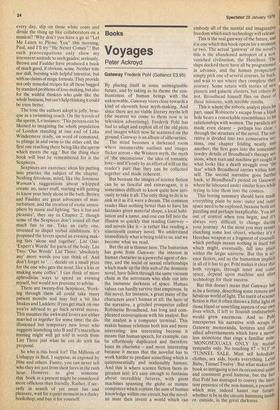Books
Voyages
Peter Ackroyd
Gateway Frederik Pohl (Gollancz E3.95)
By placing itself in some unimaginable future, and by taking as its theme the confrontation of human beings with the unknowable, Gateway veers close towards a kind of eleventh hour myth-making. And since there are no viable literary myths left (the nearest we come to them now is in television advertising). Frederik Pohl has had to adapt and exploit all of the old plots and images which now lie scattered on the ground. Gateway is an album of silhouettes. The mind becomes a darkened room where innumerable outlines and images flicker across -S the Western myth, the myth of 'the unconscious', the idea of romantic love — and it's only by an effort of will on the reader's part that they can be collected together and made coherent.
But because the images of science fiction can be so fanciful and extravagant, it is sometimes difficult to know quite how seriously to take it all. The only thing to do is to sink in it as if it were a dream. The common reader likes nothing better than to have his fantasies given material shape, a local habitation and a name, and one can fall into the illusion so quickly that reading Gateway — and novels like it — is rather like reading a nineteenth century novel. We understand immediately what is being told to us, and we become what we read.
But the air is thinner here. The humanism has gone from Gateway: the interest in human character as a powerful agent of destiny, and the social or sexual relationships which made up the thin web of the domestic novel, have fallen through the same vacuum chute as the astronauts who slide out into the immense darkness of space. Human values can hardly survive that emptiness. In this novel, for instance, a great many of the characters aren't human at all: the hero of the narrative, a grizzled prospector called Robinette Broadhead, has long and complicated conversations with his analyst. But the analyst is a computer terminal. This makes human relations both less and more interesting: less interesting because it means that human speech, for example, can be effortlessly duplicated and therefore loses its charisma — and more interesting because it means that the novelist has to
work harder to produce something which is quintessentially and inalienably human.
And this is where science fiction faces its greatest test: it's easy enough to fantasise about incredible futures, with giant machines spanning the globe or minute computers which contain the sum of human knowledge within one circuit, but the novelist must then invent a world which can embody all of the mental and imaginative freedom which such technology will release. This is the real gateway of the future, and it is one which this book opens for a moment
or two. The actual 'gateway' of the novels title is the abandoned astroport of a now vanished civilisation, the Heechees. The ships docked there have all be programmed in advance, and the human prospectors simply pick one of several courses, lie back., and wait to see where they complete their journey. Some return with stories of new planets and galactic clusters, but others do not. Broadhead himself flies on three of these missions, with terrible results. This is where the robotic analyst plays his part, since Robinette's escape from a black hole bears a remarkable resemblance to his relationships with women. The parallels are made even clearer — perhaps too clear through the structure of the novel. The nar" rative is divided into two consecutive sec' tions, one chapter folding neatly int° another; the first goes into the sometimes tawdry details of Broadhead's therapy se!' sions, when man and machine get caught 10 what looks like a death struggle over 'the fear' which Broadhead carries within hily self. The second narrative goes further back, to Broadhead's period on Gatewah where he laboured under similar fears while trying to lose them into the cosmos. This boring summary should have made everything plain by now: outer and inner space need to be explored, because both are puzzling and perhaps inexplicable. You are out of control when you begin, and WS always very difficult to change during your journey. At the most you may return clutching some lost object, whether it's a Heechee weapon or a fragment of yourself, which perhaps means nothing in itself but which might, eventually, fall into place within the larger universe. But this is scp ence fiction, and so the humanism implicit in all of it has to go: Pohl makes it clear that both voyages, through inner and outer space, depend upon machine and alien technology for their success.
But this doesn't mean that Gateway ila5 to be a fantasy, describing some remote and fabulous world of light. The merit of science fiction is that it often throws a fitful light 00 those bland or unsettling aspects of our &II lives which, if left to flourish undisturbed, would grow enormous. And so Pohl intersperses his narrative with scraps of Gateway memoranda, lectures and dos' sified advertisements which have a nerve' less monotone that rings a familiar note: `MONOSEXUALS ONLY for mutual sympathy only. No touching 87 — 913' of 'TUNNEL SALE. Must sell holodisks, clothes, sex aids, books everything. Leve,1 Babe, Tunnel Twelve'. But what makes this book so intriguing is not its occasional satire and consistent good humour, but the fact that Pohl has managed to convey the insis' tent presence of the non-human, a presence which may indeed haunt our future, whether it be in the circuits humming inside or, outside, in the great darkness.


































 Previous page
Previous page